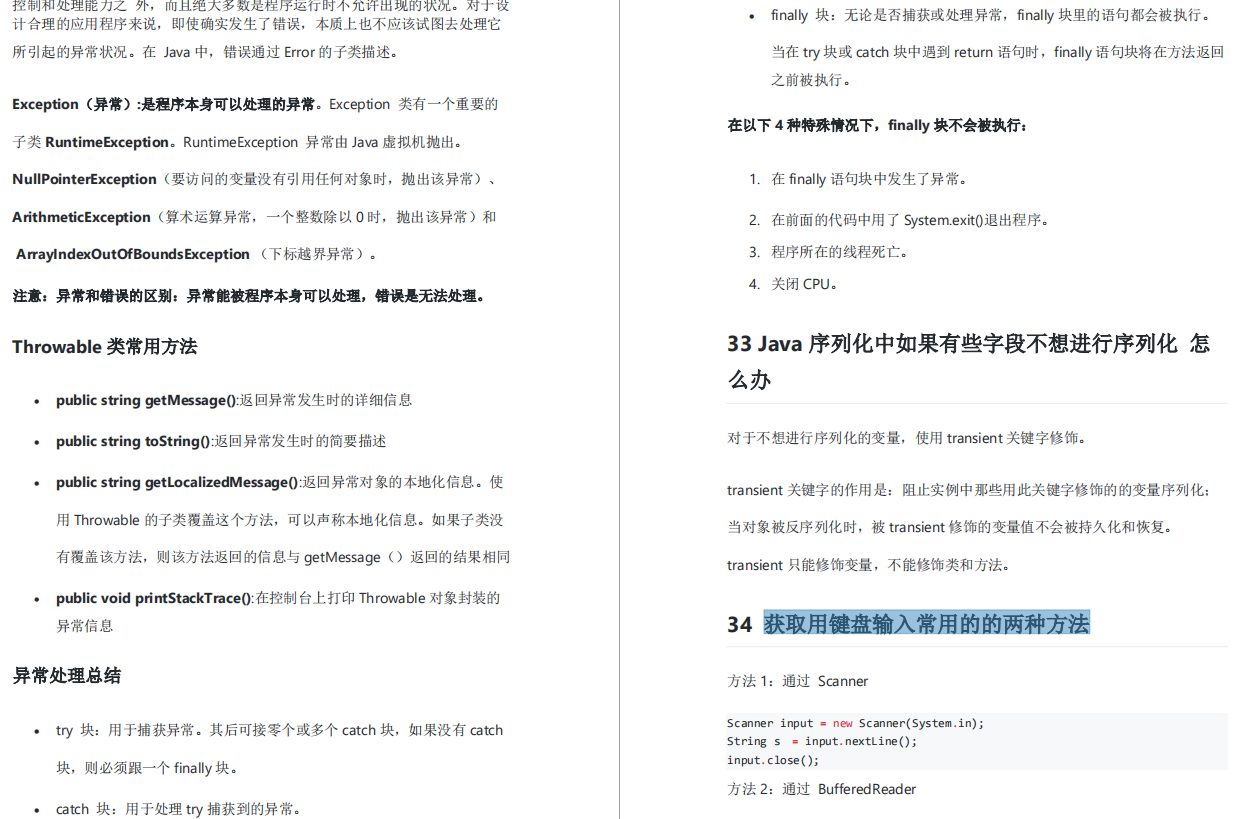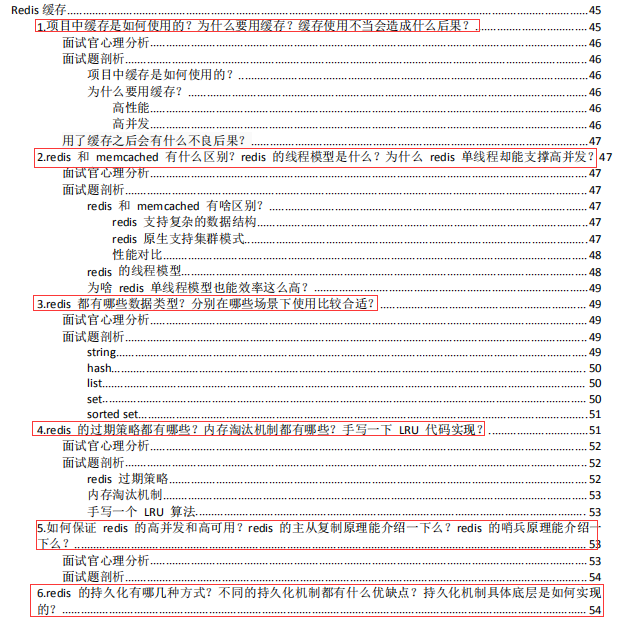Introduction
Now Java interview can be said to be a cliche question, and it is indeed the case. Interview questions, interview book, interview manual... There are a lot of various Java interview questions, and I can't read them all, and I can't read them all, and I think every interview material is nice, and then I started the collection.
Java developers should not be easily satisfied. Now that they have a 20K job, the next step is to get a 50K offer. Even an annual salary of one million is very common for programmers. If you are not satisfied with the status quo, you must have the ability to take on your position. Continuously improving skills and technology stacks are essential!
In fact, many people don't have a clear plan for themselves, and don't even know what route is suitable for them. In this case, you will be farther and farther away from the offer of the instrument! At any time, you need to have a clear understanding of yourself. Will you plan your learning route in advance?

So what is the point of me writing this this time? Might as well stop by and have a look. You can review more systematically and methodically, and prepare for the gold medal, nine silver medals and ten games. Has the following purposes:
- You can review through a system to solve the problem of not knowing where to start and how to start?
- Establish a systematic review system, each knowledge point is independent and related?
- Review and summarize the interview points of the major factories, and start from your own reality to understand where the gap is?
Of course, in addition to these, there are also some beautiful learning materials, which are summarized very comprehensively, including more than 20 knowledge points, from basic to advanced!
Java basics (object + thread + character + interface + variable + exception + method)
-
What is the difference between object-oriented and process-oriented?
-
What are the characteristics of the Java language?
-
The most detailed and popular answers about JVM JDK and JRE
-
Comparison of Oracle JDK and OpenJDK
-
Difference between Java and C++?
-
What is the main class of a Java program? What is the difference between the main class of an application and an applet?
-
What are the differences between Java applications and applets?
-
The difference between character constants and string constants
-
Can the constructor Constructor be overridden?
-
What is the difference between overloading and overriding?
-
Three major features of Java object-oriented programming: encapsulation inheritance polymorphism
-
What is the difference between String StringBuffer and StringBuilder? Why is String immutable?
-
Automatic boxing and unboxing
-
Why is it illegal to call a non-static member inside a static method?
-
What is the effect of defining a constructor that does nothing and takes no parameters in Java?
-
What is the difference between import java and javax?
-
What is the difference between interface and abstract class?
-
What is the difference between member variables and local variables?
-
What operator is used to create an object? How is an object entity different from an object reference?
-
What is the return value of a method? What is the function of the return value in the method of the class?
-
What is the function of the construction method of a class? If a class does not declare a construction method, can the program be executed correctly? Why?
-
What are the characteristics of the constructor?
-
How are static methods different from instance methods?
-
What is the difference between the equality of objects and the equality of references to them?
-
Before calling the constructor of the subclass, the constructor of the parent class without parameters will be called first. What is the purpose?
-
== and equals (important)
-
hashCode and equals (important)
-
Why is there only pass by value in Java?
-
Briefly describe the basic concepts of threads, programs, and processes. and what is the relationship between them
-
What are the basic states of a thread?
-
Some conclusions about the final keyword
-
Exception handling in Java
-
What if some fields do not want to be serialized in Java serialization?
-
Get the two methods commonly used for typing with the keyboard?
I have only listed 34 representative questions about the basics of Java. The questions are here, and the corresponding answers are also included (organized into PDF). This article cannot be displayed in full (take a few screenshots to see), and there are also interview questions for intermediate development + senior programmers below.

Partial Java Basics Interview Answers

Partial Java Basics Interview Answers
Java intermediate development (bottom + Spring related + Redis + distributed + design mode + MySQL + high concurrency + lock + thread)
-
The underlying implementation principle of HashMap, red-black tree, B+ tree, structure principle of B tree, volatile keyword, CAS (comparison and exchange) implementation principle
-
What are Spring's AOP and IOC? What are the usage scenarios? Spring transactions, transaction properties, propagation behavior, database isolation level
-
What are the annotations of Spring and SpringMVC, MyBatis and SpringBoot? The working principle of SpringMVC, the advantages of the SpringBoot framework, the advantages of the MyBatis framework
-
What are the SpringCould components and what do they do? (Say seven or eight) What is the CAP of microservices? What is BASE?
-
Design pattern (say five or six)
-
Data types supported by Redis and usage scenarios, persistence, sentinel mechanism, cache breakdown, cache penetration
-
What is a thread, there are several implementation methods, what is the difference between them, the principle of thread pool implementation, JUC concurrent package, the difference between ThreadLocal and Lock and Synchronize?
-
Distributed transactions (how to ensure data consistency between different systems (system A writes data, system B fails to write for some reason, resulting in data inconsistency))
-
Security issues (data tampering (get someone else's URL, tamper with data (amount) and send it to the system))
-
Restrictions on the use of indexes, what are the sql optimizations, data synchronization issues (cache, database data synchronization)
-
There are several steps to initialize the Bean object, its life cycle
-
JVM memory model, algorithm, garbage collector, tuning, class loading mechanism (parent delegation), creating an object, how is this object allocated in memory?
-
How to design a seckill system? (High concurrency and high availability distributed cluster)
-
What are pessimistic locks, optimistic locks, read-write locks, row locks, table locks, spin locks, deadlocks, distributed locks, thread synchronization locks, fair locks, and unfair locks?
-
Heap overflow, occurrence scenarios and solutions of stack overflow
-
Tell the difference between several kinds of MQ, and why use this kind of MQ, the message is sent repeatedly (idempotence), the message fails to be sent, the message is dropped, the message cannot be received for a long time, and the sent message is too large to cause the reception to fail
-
Single sign-on implementation principle
-
If there are hundreds of millions of data, how do you quickly find one of the data you want (several simple algorithms)
-
The operating principle of Dubbo, what protocols are supported, why it is more efficient than SpringCould, and the underlying principles of Zookeeper
-
If you lead a team and ask you to design a system, what do you need to consider?

Java Intermediate Development Partial Answers

Java Intermediate Development Partial Answers
Java advanced "programmer" (high concurrency + Redis cache + distributed + message queue + high availability + microservices + sub-database and sub-table + read-write separation)
-
High concurrency (classic interview question: how to design a high concurrency system?)

How to design a high concurrent system?
-
Redis cache


-
distributed


-
message queue


-
high availability


-
microservice

-
Sub-library and sub-table

-
read-write separation

The Java advanced "programmer" interview part (the title has been marked with a red frame), I divided it into 8 parts in total, including high concurrency, Redis cache, distributed, message queue, high availability, microservices, sub-database sub-table, read-write separation, etc., and each topic of each part has a corresponding interviewer's psychological analysis and interview topic analysis, so that we can clearly understand where the focus of the topic is at this time during the interview, and where to start to overcome it!

Part of the Java senior "programmer" interview answers
